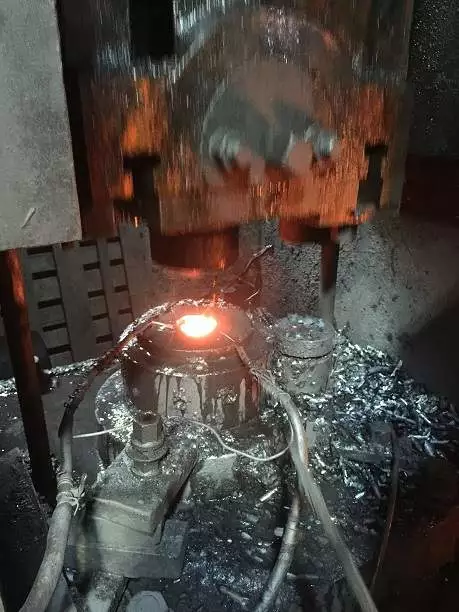Closed Die Forging Services

On this page
What Is Closed  Die Forging?
Die Forging?
Closed die forging, also called impression die forging, is a primary metalworking process where preformed metal blanks are pressed or hammered into dies shaped as three-dimensional negatives of the desired part. This method fully encloses the workpiece between the hammer and anvil, ensuring metal fills all die areas, producing complex parts with tight tolerances and a wide variety of 3-D shapes. Closed die forging stands as the predominant industry method for crafting intricate and challenging geometries, providing a multitude of options for crafting precision-made, high-strength components and tools. Common materials subjected to closed die forging encompass high alloy steel, naval brass, carbon steel, aluminum, alloy metals, stainless steel, copper, nickel, tool steel, and titanium.
The Process of Closed Die Forging
Closed die forging involves the reshaping of a preheated metal billet or blank positioned within precisely designed dies, aiming to create a completed component. These dies are intricately tailored to replicate the envisioned shape of the end product. The method entails applying substantial pressure to the billet, typically achieved via hydraulic presses or mechanical hammers, compelling the metal to smoothly conform to and occupy the recesses of the dies. This precisely controlled deformation process endows the forged components with numerous advantageous characteristics.
Advantages of Closed Die Forging
This technique offers several significant advantages, including:
●Customization: It allows for the creation of intricate designs and forms, simplifying customization for specific manufacturing needs.
●Increased Production Rates: Closed die forging enables higher production rates compared to other manufacturing methods. Robotic forging work cells further enhance production efficiency.
●Efficient Material Utilization: Closed die forging optimizes material usage by precisely filling the die cavities, thereby minimizing waste. This heightened efficiency not only lowers raw material expenses but also reduces environmental impact.
●Enhanced Strength: Through forging, the grain structure of the metal undergoes refinement, leading to improved mechanical properties. This results in components featuring remarkable strength, toughness, and resistance to fatigue, making them highly suitable for rigorous and demanding applications.
●Cost Efficiency: Despite the substantial initial investment in dies and tooling, closed die forging proves exceptionally cost-effective when producing substantial volumes. The minimal per-part recurring expenses render it a compelling choice for mass production.
●Increased Production Rates: Closed die forging enables higher production rates compared to other manufacturing methods. Robotic forging work cells further enhance production efficiency.
●Efficient Material Utilization: Closed die forging optimizes material usage by precisely filling the die cavities, thereby minimizing waste. This heightened efficiency not only lowers raw material expenses but also reduces environmental impact.
●Enhanced Strength: Through forging, the grain structure of the metal undergoes refinement, leading to improved mechanical properties. This results in components featuring remarkable strength, toughness, and resistance to fatigue, making them highly suitable for rigorous and demanding applications.
●Cost Efficiency: Despite the substantial initial investment in dies and tooling, closed die forging proves exceptionally cost-effective when producing substantial volumes. The minimal per-part recurring expenses render it a compelling choice for mass production.
Applications of Closed Die Forging
Closed die forging is favored for its precision, especially in the production of small parts. It finds widespread use in crafting items like forged fittings, flanges, automotive components, and more. Industries such as electronics, aerospace, automotive, manufacturing, semiconductor, construction, hardware, and food processing frequently rely on this technique.
Closed die forging is a precise and versatile metalworking technique that plays a crucial role in crafting high-strength, intricate components utilized across diverse industries. Its proficiency in attaining tight tolerances, elevating material characteristics, and curbing material wastage positions it as the preferred method for fabricating vital parts.
Closed die forging is a precise and versatile metalworking technique that plays a crucial role in crafting high-strength, intricate components utilized across diverse industries. Its proficiency in attaining tight tolerances, elevating material characteristics, and curbing material wastage positions it as the preferred method for fabricating vital parts.
Next: Alloy Steel Drop Forging Service
Previous: Precision Forging Services
